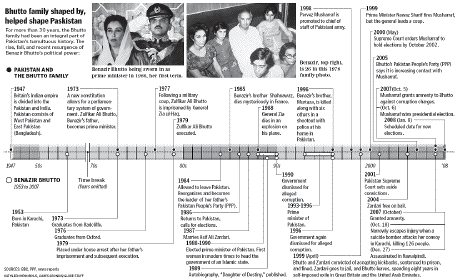Adil Najam
Benazir Bhutto, twice Prime Minister of Pakistan, now lies under six feet of earth in Garhi Khuda Bux, her ancestral village, in a grave next to her equally mercurial father, the late Prime Minister Zulfiqar Ali Bhutto.
As the graphic above (click to enlarge) from Boston Globe shows, hers – like her father’s – was a brilliant but tragic life. Tragically ended.
Now she is buried. But I suspect that the Benazir saga is far from over. Indeed, just as all of Pakistan’s politics after Zulfiqar Ali Bhutto’s hanging was contextualized by his hanging, all of Pakistan’s politics after Benazir’s assasination is likely to be contextualized by Benazir’s assasination.
In the immediate aftermath of this tragic death, the country continues to reel in grief at what has happened, fear about what might happened, and immense immense anger and everything that has been happening. As I argued in an op-ed in the New York Daily News today, this mix of grief, anger and fear is a very dangerous combination. It cannot lead to any good.
Right now the scenes we see on our screens are of mayhem, of devastation, of further violence, of destruction. These are not good images for Pakistan and certainly these are not the Benazir Bhutto would have wanted as her legacy. We at ATP have written many many times about the climate of anger that defines modern Pakistan (here here, here, here, here, etc.). This anger is the single most disturbing and single most defining motif of today’s Pakistan. Right now – and not without reason – the anger is being directed at Gen. Pervaiz Musharraf’s government. Much of this should, but not in this way.
More important to note is who the anger is not being directed at. I hope that the legacy of Benazir Bhutto’s untimely and tragic death is a legacy of a society that seizes this moment to reassert its demand for democracy and to recognize that extremist violence is our problem. This is not a mercenary war. This is Pakistan’s own battle. Right now the evidence suggests that society continues to tear at its own self. I fear that it will not change anytime soon. That things are likely to get worse before they become any better. But, I refuse to give up hope. At least, not yet.
As I wrote in my New York Daily News op-ed:
If this moment ends up being defined by Pakistan’s latent anger – if it launches a cycle of crackdowns and protests – it will certainly empower and embolden the militants further. But if it is defined by society’s sense of shared loss, felt grief and the continued movement toward genuine democracy, it might – just might – bring together a fractured society and awaken in them the realization that the common enemies are extremism, violence and terrorism. Then, we might just have half a chance of winning this war on terror. And Benazir Bhutto’s death would not have been in vain.





















































I think Shoukat Aziz should come into Politics. I find him a true servant of Pakistan.
Last night there were protests and burnings in Karachi, Lahore, Islamabad, Peshawar and interior Sind. If they escalate over the next two or three days they will pose a dilemma for the Musharraf Government.
His options are dwindling by the day. He cannot impose yet another Emergency if things continue to get out of hand. Having relinquished Army Command, imposing Martial Law would be risky for him. It also augurs bad for politicians and activists hoping to usher in some form of democracy in Pakistan.
It is the country’s misfortune that it does not have leaders of stature that can rally the people to be calm.
Martial Law looks an option now but it comes with a price. We have heavily paid the price for it in the past.
For how long more do the people have to suffer under the occupying army?
@ Alternatives for Pakistan’s politics
For a change, let us all together try to
look for alternatives,
choose our own people from our own
“background” culture, creed,
educated by the environment of the soil,
entirely brought up and disciplined in
our morals and ethics,
undertanding and strifing for our demands and
requirements, representing us and our generations
with essentially belonging and faithfull to Pakistan.
In the short term, people are angry and their anger is wrongly getting channelled through burning and destroying property which is a very bad sign. Today’s news sadly says that 6 workers in Korangi, Karachi were burnt alive when people protesting BB’s death set a factory on fire with people inside. This and all kinds of violence MUST stop.
In the longer run, I see Sindh and its politics getting deeper into isolation. Effectively, as of now I don’t see any national leader who could have some popularity in all provinces of Pakistan. All we have now are the so-called National parties with at-best regional support only.
Somebody has to emerge as a national leader to take everyone forward together and to put ‘marham’ on grieving people and also to educate those who know no other way to vent their anger except by burning public/private property.
Million dollar question now is who could this ‘unifying’ leader be? atleast I don’t know for now who could it be.
This is a reminder how important is to go after Extremism. Every Pakistani must understand what many extremists are doing has no place in Quran. We should protest acts of extremists and humiliate these extremists who are using name of Islam for their personal agenda or personal ego.
Muslim Scholars must come out and speak against them. We must respect our ruler whoever he is and give him the chance to finish his job. Unless we have proof of him doing things against the interest of Pakistan.